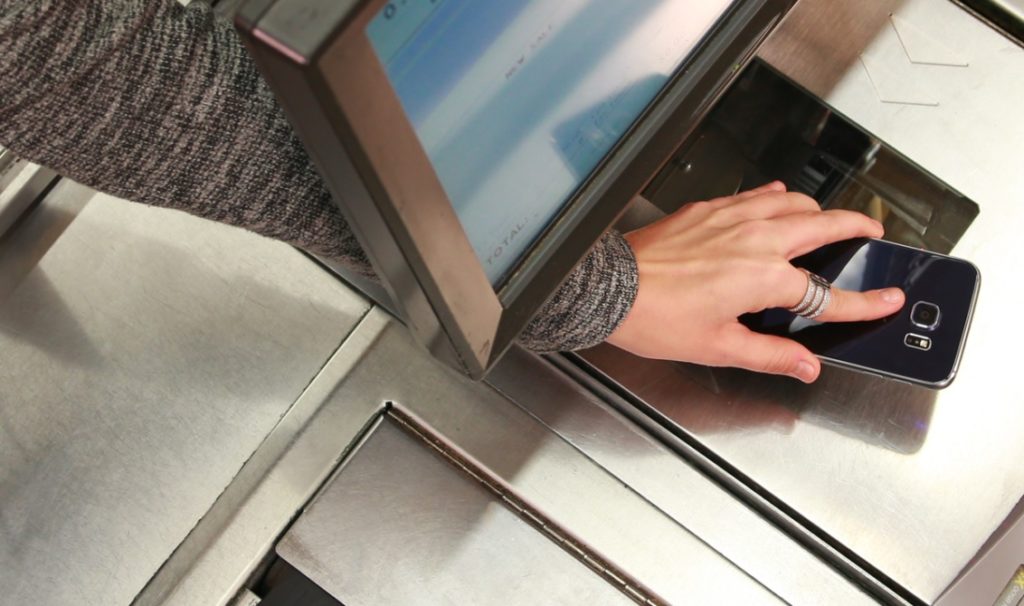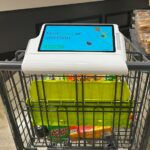Mobile manufacturer’s coupons apparently didn’t die with the defunct company that was bound and determined to make them commonplace. The new owner of the technology is still fiddling with it, in an effort to bring mobile coupons to a grocery store and a phone near you.
In a newly-published patent application, Samsung describes a system in which your phone will “hear” the beep from the scanner when you redeem a mobile coupon, allowing a manufacturer to know when its coupon is used, in real time.
To be clear, mobile coupons are different from digital coupons that you’re probably accustomed to. Digital coupons are the ones you click and load to your account, then redeem by scanning a loyalty card or entering your phone number when you check out. Mobile coupons are offers on your phone, that you redeem by scanning a bar code directly off your phone’s screen.
It may sound like six of one, half dozen of the other, but mobile and digital coupons are very different. Digital coupons are retailer-specific, while mobile manufacturers’ coupons could be used anywhere you shop, just like paper coupons.
If you wish you could use paperless coupons at a store like Walmart that has stubbbornly resisted offering digital coupons, mobile coupons are the way to go.
Or are they? One of the challenges in offering paperless coupons is how to ensure the retailer gets reimbursed. Paper coupons are stuffed into a bag and mailed to a clearinghouse, which tallies them up and bills the manufacturer for reimbursement. Paperless coupons require retailers to transmit an electronic redemption record in order to get reimbursed by manufacturers.
Samsung is proposing a different way. Its system would determine whether your coupon is valid and allow the retailer to settle up with the manufacturer in real time – by making your phone do the work.
When you scan a mobile coupon on your phone and it matches the product you’re purchasing, the store’s point-of-sale system will make a special beep, according to Samsung’s description. “This audio acknowledgement signal is received via a microphone of the mobile device and is decoded by a mobile device application program,” the patent application reads. “The mobile application can transmit this redemption information to the manufacturer,” thus “closing the loop”, by letting a coupon issuer know right away when its coupon was used, who used it and where.
Could this entice manufacturers to get on board and start issuing mobile coupons that you can use anywhere you use paper coupons?
Companies like Procter & Gamble and General Mills have already experimented with mobile coupons that were offered by Mobeam. Those coupons turned bar codes into beams of light that would be transmitted to a store’s scanner, since most retailers’ point-of-sale systems can’t read traditional bar codes off a phone’s screen.
But the idea never caught on, and Mobeam hung it up earlier this year, selling off its technology to Samsung. The new patent application shows that Samsung is tinkering with its new acquisition, trying to solve at least one of the problems that mobile coupons present, as compared to load-to-card digital coupons.
And there are plenty of other problems yet to be solved. Unlike digital coupons that can be redeemed all at once, mobile coupons’ bar codes would have to be scanned individually, one after the other, which is both cumbersome and time-consuming. Digital coupons are redeemable just by swiping a card or entering your phone number, while mobile coupons require a phone and an internet connection, which can present a problem for customers in rural areas with spotty cell service.
Most importantly, digital coupons are already widely used – so why would a retailer that has a perfectly good paperless coupon system want to mess with a newfangled third-party invention that beams unknown information into their point-of-sale systems?
Mobeam had hoped to democratize paperless coupons, allowing them to be used at smaller independent stores that don’t have digital coupon programs, as well as at digital coupon holdouts like Walmart. Instead, Mobeam gave up and now Samsung is picking up where Mobeam left off.
So could audio signals sent to your phone be the thing that helps mobile coupons become commonplace? Or is Samsung chasing an idea that most retailers and manufacturers will simply never get on board with?
“The use of mobile manufacturer coupons has significant advantages to both the consumer and the issuing manufacturer,” Samsung’s patent application reads. “For the consumer, it eliminates the need to cut out the coupons from a newspaper or other coupon booklet, and for the issuer, it can provide a direct relationship with the consumers as the mobile coupons can be tracked to individual users via the mobile device. This direct relationship enables the manufacturer to better anticipate the needs of the individual shopper and offer more relevant coupons than would be otherwise possible.”
So Samsung is making its case. Now it’s up to retailers and manufacturers to decide whether to make it happen.
Image source: Mobeam
















